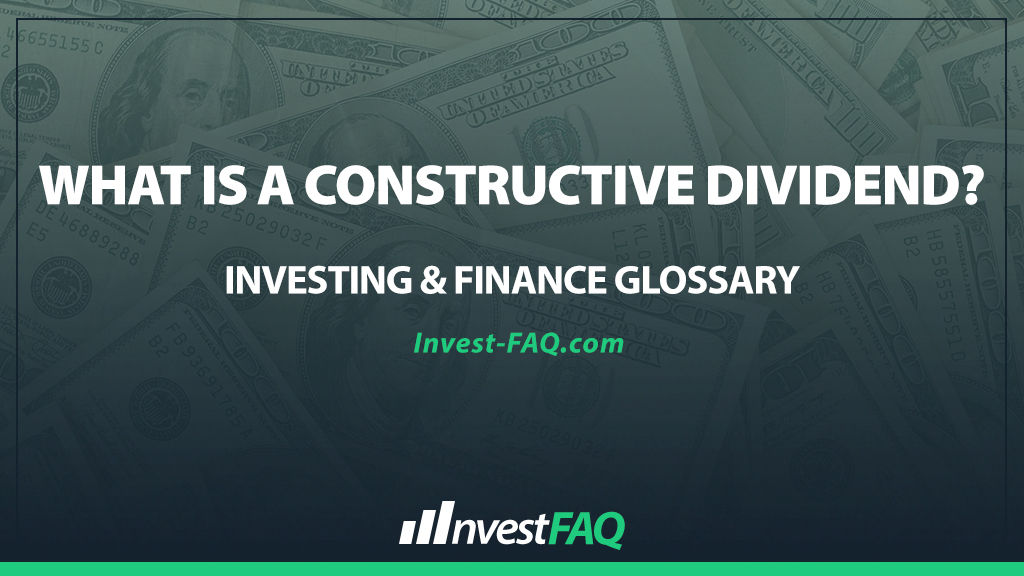
Constructive Dividend
Contents
A constructive dividend is an economic benefit a corporation provides to its shareholders or related parties that is not formally declared as a dividend. Instead, it is considered a dividend for tax purposes because it represents a distribution of earnings and profits outside of the typical dividend mechanism.
Constructive dividends often occur in closely held corporations where shareholders may receive benefits that are not available to the general public or that do not reflect an arms-length transaction.
These can include excessive compensation, personal use of corporate assets, or loan forgiveness. Tax authorities view these benefits as disguised dividends, subject to dividend taxation.
Example of a Constructive Dividend
“Elite Tech Inc.,” a closely held corporation, allows one of its shareholders, who is also an executive, to use a company-owned luxury apartment rent-free. The fair market rental value of the apartment is $30,000 annually. This benefit is not declared as a dividend nor included in the executive’s compensation package.
Benefit Provided: Use of a company-owned luxury apartment
Fair Market Value: $30,000 annually
Tax Implication: The IRS treats the $30,000 benefit as a constructive dividend, taxable to the shareholder at the dividend tax rate.
In this scenario, the shareholder receives an economic benefit that reduces the corporation’s assets without a corresponding entry of income on the shareholder’s part.
For tax purposes, the IRS would reclassify this benefit as a constructive dividend, meaning the shareholder must include the $30,000 in their taxable income as if it were a dividend.
This reclassification also affects the corporation’s earnings and profits account but does not allow for a deduction as would compensation or rent expenses.
Significance for Investing & Finance
The concept of constructive dividends is significant in accounting and tax planning for several reasons:
Tax Compliance: Understanding what constitutes a constructive dividend is crucial for tax compliance. Businesses must be aware of how certain transactions may be perceived by tax authorities to avoid unintended tax liabilities.
Corporate Governance: Properly distinguishing between legitimate business expenses and potential constructive dividends is essential for maintaining transparent and fair corporate governance practices, particularly in closely held companies.
Financial Planning: Companies need to consider the tax implications of constructive dividends in their financial planning. The reclassification of certain expenses as dividends can affect the company’s tax obligations and the distribution of profits.
Shareholder Relations: The classification of payments or benefits as constructive dividends can impact shareholder satisfaction and expectations regarding the company’s dividend policy and overall financial management.
In summary, a constructive dividend represents an informal distribution of earnings to shareholders that, while not declared as a dividend, has tax implications both for the recipient and the corporation.
Recognizing and managing these transactions is critical for ensuring tax compliance, maintaining corporate governance standards, and effectively managing a company’s financial resources.
FAQ
What is a constructive dividend in corporate taxation?
A constructive dividend occurs when a corporation provides a benefit to a shareholder that is not formally declared as a dividend, leading to tax implications as it is treated as a dividend for tax purposes.
How does a constructive dividend differ from a regular dividend?
Unlike a regular dividend that is officially declared by a corporation and distributed equally among shareholders, a constructive dividend can be an indirect benefit or payment that favors one or more shareholders and is not necessarily distributed in cash.
Yes, a loan from a corporation to a shareholder can be considered a constructive dividend if the loan is interest-free or offers terms more favorable than market rates, implying a benefit to the shareholder.
What are the tax implications of receiving a constructive dividend?
Receiving a constructive dividend results in taxable income for the shareholder that must be reported, and it may also affect the deductibility of expenses for the corporation providing the benefit.
